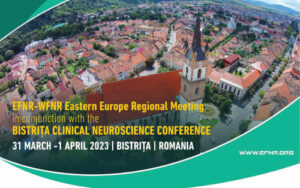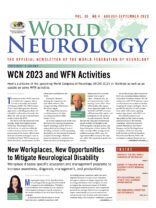By Dafin F. Muresanu
The EFNR-WFNR Eastern Europe Regional Meeting in conjunction with the Bistrița Clinical Neuroscience Conference, took place March 31-April 1, 2023, in Bistrița, Romania. This significant academic gathering was held in a hybrid format and featured esteemed experts from various fields discussing potential advancements in neurorehabilitation. The event was jointly organized by the European Federation of Neurorehabilitation Societies (EFNR), the World Federation for Neurorehabilitation (WFNR), the County Council of Bistrița-Năsăud, and the County Clinical Emergency Hospital Bistrița. It received support from multiple organizations, such as the World Federation of Neurology (WFN), Foundation of the Society for the Study of Neuroprotection and Neuroplasticity (SSNN), the Foundation for the Study of Nanoneurosciences and Neuroregeneration (FSNN), the Romanian Academy, and the Romanian Society of Neurology (SNR).

EFNR-WFNR Eastern Europe Regional Meeting
The event attracted over 150 participants from Eastern Europe, making it a remarkable success. World-renowned experts gathered to discuss a diverse range of topics, including post-stroke neurorecovery, cognitive decline after stroke, pharmacology in functional recovery, clinical case studies, traumatic brain injury treatment developments, effective stroke recovery, motivation in neurorehabilitation, innovation and sustainability, early rehabilitation after aneurysmal subarachnoid hemorrhage, cerebral vein and dural sinuses thrombosis, autonomic dysfunction in Parkinson’s disease, immunomodulatory treatment for multiple sclerosis, complex management of adult SMA patients, neurorehabilitation peculiarities in multiple sclerosis, and computer-assisted and robotic neurorehabilitation for stroke patients. Prof. Dafin F. Muresanu, EFNR president, and Prof. Volker Hömberg, WFNR president, led the scientific event, with experts from around the world sharing their knowledge on various neurorehabilitation subjects. As a special guest of the event, Prof. Wolfgang Grisold joined online for the opening ceremony to express his support of EFNR-WFNR initatives and congratulate both societies for the efforts.The regional meeting emphasized international viewpoints on current topics while showcasing national experiences and perspectives from countries such as Bulgaria, Hungary, Poland, the Republic of Moldova, Romania, Serbia, and Slovenia. During the March 31st meeting, the current state of neurorehabilitation in Eastern Europe was discussed. This specialized gathering aimed to present the health care systems and neurorehabilitation specifics of these countries, focusing on strategies to overcome limitations and improve neurorehabilitation approaches.
The objective of the event was to develop a joint action plan and extend the educational outreach and network of WFNR and EFNR. Another goal was to establish institutional partnerships among National Rehabilitation Societies.
The EFNR-WFNR Eastern Europe Regional Meeting, combined with the Bistrița Clinical Neuroscience Conference, served as a unique forum for knowledge exchange.
The National Neurology Forum 2023: Patients, Doctors, Authorities, Industry—Together for the Future of Neurology
The Romanian National Neurology Forum emerged as a distinctive and unparalleled event in the realm of neurological science, transcending toward policy the knowledge shared at the Annual Congress of the Neurological Society in Romania. Convening at the Palace of Parliament in Bucharest on April 21 and 22, the forum captivated over 350 participants, both in person and virtually, engaging in thought-provoking debates on pressing issues in national health care. Unlike traditional scientific conferences, the event focused on pinpointing the most effective strategies to surmount the common obstacles encountered within the Romanian Health Care System, providing valuable insights into public policy to facilitate national health care reforms.
 The forum was organized by Prof. Dr. Dafin Muresanu, president of the European Federation of Neurorehabilitation Societies, Prof. Dr. Cristina Tiu, president of the Romanian Neurology Society, and Prof. Dr. Bogdan O. Popescu, prorector at the University of Medicine and Pharmacy Carol Davila Bucharest). Coordinated by the Foundation of the Society for the Study of Neuroprotection and Neuroplasticity (SSNN), the Ministry of Health, the Romanian Society of Neurology (SNR), Carol Davila University of Medicine and Pharmacy from Bucharest, Iuliu Hatieganu University of Medicine and Pharmacy from Cluj-Napoca, and George Emil Palade University of Medicine, Pharmacy, Science and Technology from Targu-Mures, the event featured an array of topics, from neurology and associated specialties, such as neurosurgery, cardiology, diabetes and nutritional diseases, and physical and rehabilitation medicine. Officials from public authorities, universities of medicine and pharmacy, and national and international professional societies were present at the scientific proceedings, including Prof. Dr. Wolfgang Grisold, president of the World Federation of Neurology (WFN), Prof. Dr. Volker Hömberg, president of the World Federation for Neurorehabilitation (WFNR), and Prof. Dr. Alexandru Rafila, minister of health Romania.
The forum was organized by Prof. Dr. Dafin Muresanu, president of the European Federation of Neurorehabilitation Societies, Prof. Dr. Cristina Tiu, president of the Romanian Neurology Society, and Prof. Dr. Bogdan O. Popescu, prorector at the University of Medicine and Pharmacy Carol Davila Bucharest). Coordinated by the Foundation of the Society for the Study of Neuroprotection and Neuroplasticity (SSNN), the Ministry of Health, the Romanian Society of Neurology (SNR), Carol Davila University of Medicine and Pharmacy from Bucharest, Iuliu Hatieganu University of Medicine and Pharmacy from Cluj-Napoca, and George Emil Palade University of Medicine, Pharmacy, Science and Technology from Targu-Mures, the event featured an array of topics, from neurology and associated specialties, such as neurosurgery, cardiology, diabetes and nutritional diseases, and physical and rehabilitation medicine. Officials from public authorities, universities of medicine and pharmacy, and national and international professional societies were present at the scientific proceedings, including Prof. Dr. Wolfgang Grisold, president of the World Federation of Neurology (WFN), Prof. Dr. Volker Hömberg, president of the World Federation for Neurorehabilitation (WFNR), and Prof. Dr. Alexandru Rafila, minister of health Romania.
The event highlighted the National Strategy for Combating Cardiovascular and Cerebrovascular Diseases (SNBCC) as its central focus. Announced by Health Minister Prof. Dr. Alexandru Rafila in the autumn of 2022 and developed under the aegis of the Romanian Academy, the SNBCC is a central element of the 2023-2030 National Health Strategy. The scope of the policy is to improve health care approaches for the Romanian population by implementing a comprehensive reformative plan in the field of cardiovascular and cerebrovascular diseases. Furthermore, the objectives include assessing the impact of cardiovascular and cerebrovascular diseases on the Romanian population, developing prevention programs, advancing the domain of human resources specializing in interventional neurology, increasing access to neurorehabilitation services, and expanding the national network for stroke intervention.
Panel discussions covered a wide range of topics, including the implications of SNBCC for the Romanian health care system, the importance of prevention in cardiovascular and cerebrovascular diseases, Parkinson’s disease, epilepsy, cognitive impairment and dementia, multiple sclerosis, peripheral neurological diseases, neuro-oncology, and headaches and migraine. Each panel provided comprehensive approaches to understanding and addressing the various aspects of neurological conditions and health care. Discussions also emphasized the need for enhanced collaboration among the private and public sectors and authorities, converging toward the common goal of improved education and communication of public health knowledge.
The National Forum aimed to gather scientific insights from international health care systems to provide a comparative framework for future systematic guidelines. Moreover, the event provided ample opportunities for networking among medical professionals, researchers, patient association representatives, central public authorities, medical societies, and medical equipment producers and traders. •
Dafin F. Muresanu is president of the European Federation of NeuroRehabilitation Societies (EFNR), secretary general AMN (Academy for Multidisciplinary Neurotraumatology), past president of the Romanian Society of Neurology, and professor of neurology, chair of the department of neurosciences at “Iuliu Hatieganu” University of Medicine and Pharmacy in Cluj-Napoca, Romania.
